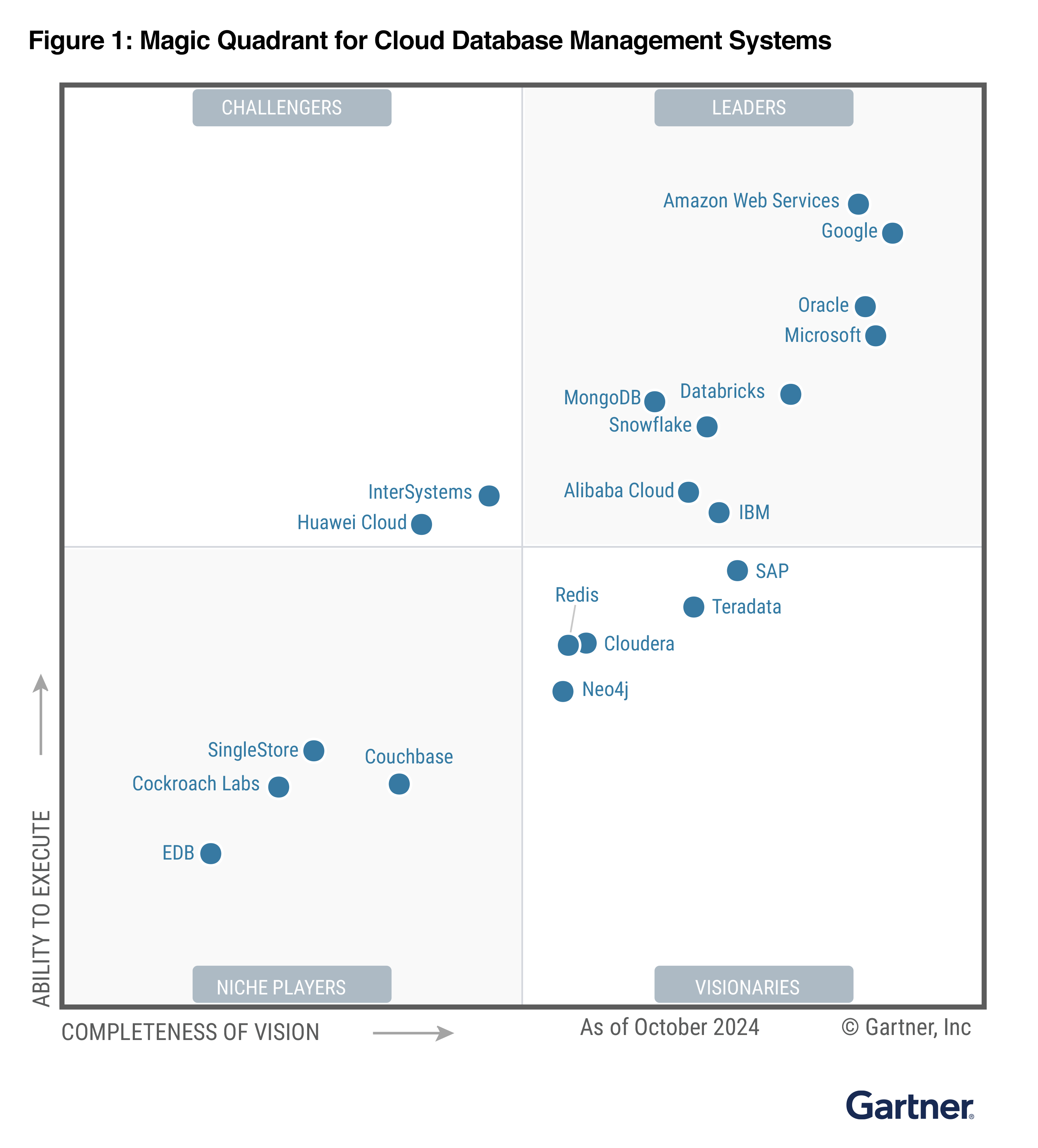Alibaba Cloud, the digital technology and intelligence backbone of Alibaba Group, has been named a Leader in the 2024 Gartner® Magic Quadrant™ for Cloud Database Management Systems (DBMS) for the fifth year in a row.

Image: Magic Quadrant for Cloud Database Management Systems
Gartner evaluates cloud DBMS vendors based on their Ability to Execute and Completeness of Vision, with criteria across 15 critical areas, including product or service, customer experience, market understanding, offering (product) strategy, and innovation, to determine their placement in the Magic Quadrant. As per Gartner, “Leaders may represent diverse cloud ecosystems, of which their cloud DBMS is a part, or have good interoperation with such systems. These vendors demonstrate consistently high customer satisfaction and strong customer support.”
“We are honored to be named a Leader in the Gartner Magic Quadrant for cloud DBMS report for the fifth year in a row,” said Dr Feifei Li, President of Database Products Business at Alibaba Cloud. “In the era when effective data management becomes a crucial infrastructure for business operation in a range of industries as well as for generative AI development, we remain committed to delivering cutting-edge and high-performancesolutions that empower businesses to harness the full potential of their data.”
Cloud-native innovation and enhanced partner ecosystem to support customer success
Alibaba Cloud offers a broad range of self-developed, cloud-native database products, including relational database PolarDB, data warehouse AnalyticDB, multimodal database Lindorm, and the Data Management Service (DMS), and constantly upgrades its product capabilities. At its flagship event Apsara Conference in 2024, to help organizations efficiently manage their data and unleash values, Alibaba Cloud introduced DMS: OneMeta+OneOps. This platform enables a unified management of data sources in databases, data warehouses, and data lakes across multiple cloud environments. The platform will boost the data utilization rate by 10 times.
Alibaba Cloud is committed to establishing a diverse and open ecosystem with database vendors. Through collaboration with global partners such as MongoDB, ClickHouse, and SelectDB, Alibaba Cloud provides a variety of options for third-party database products, open-source products, and integrated solutions to support customers’ changing demands.

Alibaba Cloud’s cloud-native database innovations as well as its partner ecosystem havebeen widely adopted by companies across diverse industries from finance, retail, and internet, to generative AI builders.
MiniMax, a leading AI technology company in China, has leveraged Alibaba Cloud’s multimodal database Lindorm as its underlying data service to build the MiniMax API Platform and GenAI application Hailuo AI. Embedded with built-in AI inference capability, Lindorm provides large-scale data storage and high-performance data retrieval capabilities, supporting MiniMax to quickly build its intelligent AI search services.
TNG Digital operates Malaysia’s largest fintech platform, TNG eWallet, serving over 22 million verified users and supporting payments for more than 2 million merchants nationwide. It worked with Alibaba Cloud to support its growing user base while ensuring a seamless experience. During the eMADANI event, TNG eWallet maintained a stable service with zero downtime, supported by Alibaba Cloud’s advanced and secure cloud products. By utilizing the cloud-native database PolarDB, the platform effectively managed a large volume of transactions, ensuring a seamless customer experience even during peak periods. Additionally, Alibaba Cloud provides NoSQL database ApsaraDB for MongoDB to support TNG Digital eWallet to explore business opportunities through AI innovations.
ZA Bank, the first and largest digital bank in Hong Kong, has fully migrated to Alibaba Cloud database services to achieve secure, scalable, and efficient data management. By adopting Alibaba Cloud relational database ApsaraDB RDS for MySQL within its core system, ZA Bank can quickly adjust computing resources and storage capacity based on business demand. This on-demand scalability allows the bank to effectively manage traffic fluctuations. Additionally, RDS MySQL provides multi-layered security protections, including data encryption, access control, security auditing, and DDoS protection to ensure data security and privacy, while meeting compliance requirement


















